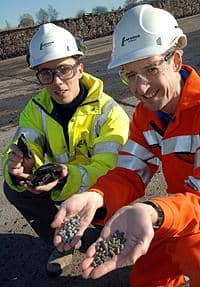The move follows increasing interest in SRF from the cement industry, with cement firm Cemex only last month announcing that it could now use the fuel on a permanent basis at its Barrington works in Cambridgeshire (see letsrecycle.com story).
Lafarge claims that the fuel will help it to divert waste from landfill and reduce its carbon emissions by around 17,000 tonnes a year.
Cauldon works manager Nicholas Maes said: “Using SRF will help Lafarge Cement maintain its environmental performance, contribute towards meeting Government targets to reduce climate change and help use keep a check on increasing fuel costs. We will also be helping to address a growing UK issue by making positive use of waste.”
Fuel
At the Cauldon works, SRF will be derived from a mixture of paper, plastic and biodegradable waste which was generated from homes and businesses and processed through mechanical biological treatment. This sees recyclable materials removed and the residual fraction composted.
Although it is unclear as yet where it will be sourced from, a Lafarge spokeswoman said that it had identified a number of potential suppliers with which it would “firm up” arrangements through its subsidiary, Glacier, which already secures other waste-derived fuels for the plants.
It is expected that waste -derived fuels will altogether replace 45% of the fossil fuels at the plant this year.
Waste-derived fuels already in use by Lafarge include meat and bone meal, whole and chipped tyres source by its Sapphire energy recovery business, recovered fuel oil and recycled liquid fuel.
Jamie Randall, general manager for Lafarge Cement's resource recovery business Glacier and Sapphire, said: “The use of waste-derived fuel is fundamental to Lafarge's drive for increased sustainability in its operations.
“The cement-making process is extremely energy intensive and with rapidly escalating fuel and electricity costs, these materials offer us an ideal way of maintaining our environmental performance and keeping the process economical,” he added.








Subscribe for free